David Teachout's Blog, page 20
September 24, 2014
Religion and the Failure of Liberal Thought
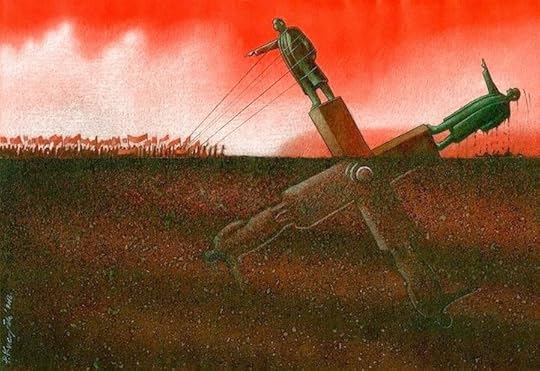 Criticizing an ideology is often difficult, prone to hyperbole and notorious for, at least in the mind’s eye of the believer, being unable to differentiate ideas from the adherents themselves. When this ideology is a religion, all of these difficulties become like Bruce Banner when he gets angry. Whatever the difficulty, what a person says about their belief has a causal or correlative connection with their behavior. To dismiss this is to ignore the very nature of humanity’s relationship with it’s existence. With the fate of future generations hanging in the balance, acknowledging and reflectively understanding what people say will determine the course of our unfolding history.
Criticizing an ideology is often difficult, prone to hyperbole and notorious for, at least in the mind’s eye of the believer, being unable to differentiate ideas from the adherents themselves. When this ideology is a religion, all of these difficulties become like Bruce Banner when he gets angry. Whatever the difficulty, what a person says about their belief has a causal or correlative connection with their behavior. To dismiss this is to ignore the very nature of humanity’s relationship with it’s existence. With the fate of future generations hanging in the balance, acknowledging and reflectively understanding what people say will determine the course of our unfolding history.Unfortunately, this dismissal is at the heart of liberal obfuscation where it concerns religion, most recently that of Islam and its currently most vehement adherent, ISIS (or ISIL). President Obama recently stated that:
"ISIL is not 'Islamic.' No religion condones the killing of innocents, and the vast majority of ISIL's victims have been Muslim. And ISIL is certainly not a state; it was formerly al Qaeda's affiliate in Iraq and has taken advantage of sectarian strife and Syria's civil war to gain territory on both sides of the Iraq-Syrian border. It is recognized by no government nor by the people it subjugates.”
There have been quite well articulated criticisms of Obama’s remarks, notably by Sam Harris and Jerry A. Coyne . Their remarks should be read in their entirety. Attempting to make similar statements would be presumptuous as well as audacious. Rather, the attempt here will be to show from within Obama’s comments the deep failure that a blind allegiance to liberal ideology brings, particularly when applied to religion.
On the face of it, stating that ISIL “is not Islamic” is both patently silly and leads to a great bout of head-scratching. The organization has as its goal the establishment of an Islamic world, the head of which sits a caliph, invoking the return of the original ruling elite following the death of Muhammad. If this isn’t Islamic then the Catholic Church isn’t Catholic. Such statements by ISIL are well known and globally spread, leading to the conclusion that Obama must either be completely ignorant of them or he has a different means of ascertaining religious adherence. We find this means in the latter part of the paragraph, where Obama states ISIL is not recognized “by the people it subjugates.” While this can point to a political existence, since ISIL is a religious organization by their own word, then the claim seems that the legitimacy of such lies at the feet of a populace.
As Coyne pointed out, all religions are man-made, so the demarcation between true or not in relation to its connection to an imaginary deity is impossible and foolish to attempt. The legitimation of a religion is and can only be made at the behest of those who adhere to it. With that in mind, then ISIL is certainly Islamic, as protested vehemently by its many adherents. That some of these may be doing so at the point of a gun is undoubtedly what Obama is pointing to, but if belief is to be gainsaid by emotional and physical coercion then there are any number of parental child-rearing tactics that Obama should have equal difficulty with and yet it would appear no bombs are being dropped on America’s heartland.
Further, the causes of a person’s allegiance to a religious ideology must be differentiated from the reasons for a particular ideology being labeled religious. The first is a psychological/biological/cultural analysis, the latter is ideological identification. One may speak of a deviation, but to dismiss a stated identification by so many adherents and not a few with the scholarship to back up their claims, is to no longer be interested in real dialogue.
That last, the lack of a desire for dialogue, may be in fact what the whole point of liberal escapism concerning religion amounts to. As Obama later states:
"ISIL is a terrorist organization, pure and simple, and it has no vision other than the slaughter of all who stand in its way.”
Connect this statement with the latter of: “no religion condones the killing of innocents” and the result is a tidy, if uninformed and dismissive, rationalization for both not connecting a group with its stated religious beliefs and wallowing in the very ‘us vs. them’ mentality that those groups rather happily enjoy living out of. Terrorism is the bugaboo of the modern politician. It is both a killer of debate and a justification for any action, no matter how ill-conceived, that indicates being against.
Declaring that ISIL “has no vision other than the slaughter of all who stand in its way” begs the question of just what it is they are attempting to achieve that others would be considered as being “in its way.” For that we go back to ISIL’s stated desire for establishing a caliphate and the inevitable connection with Islam emerges. Avoiding this at all costs is the Obama and liberal agenda.
If what a group says is in no way related to what they do, then words are meaningless, dialogue fails and all that is left is the rule of the gun. Given that the speech given was concerned with justifying a bombing campaign, dehumanizing an enemy and paving the way for irrational violent action seems exactly the point.
Perhaps most telling is an article written by Volsky and Jenkins in ThinkProgress where they state: "Ultimately, the decision of whether or not one is or isn’t religious is left up to God.” Leaving aside that this insipid comment destroys any legitimacy to their article, the result is a commitment to a brotherhood of a-rationalism.
For ISIL, the legitimation for their actions reside in a realm untouched by human rationality, humanistic moral criticism or scientific inquiry. By providing the same epistemic justification, removed as it is from any real analysis or criticism, these proponents of liberalism have bankrupted their ideology. That the conservative side has a similar identification on particular issues in no way removes the problem. Indeed, that both fall into the same trap says a great deal about humanity in general and indicates why criticism is so difficult to pursue. In going after ISIL, they’d have to question their own commitments to a deity.
Manifesting new behavior, new responses to old ideas and habits, requires a commitment to challenging even, or perhaps especially, that which is held to be holy or sacrosanct. By shielding certain ideas from criticism, by refusing to acknowledge the connection between belief and action, the only future ahead of us is a meandering road to our own destruction. We can, we must, be willing to call into question every facet of our existence, else the bright spots of our future will no longer be signals of enlightenment and progress but that of gunpowder.
© David Teachout
September 17, 2014
Our Need To Connect Can Lead To False Positives
 In the movie “Cast Away,” Tom Hanks portrays a character who, upon being stranded on an island for several years, forms a deep relationship with a volleyball. The depth of this connection is hugely disproportional to the objective nature of the object in question. A volleyball is quite incapable of interactive communication, however strong a desire exists during a game to be able to do so. Despite this fact of reality, Hanks’s character draws a face on the ball and proceeds to converse with it, forming a bond that, when the ball is lost at sea, results in profound emotional pain. Whatever can be said about this Hollywood depiction of human psychology, the need to have relationship bonds is something we all share due to our inalienable humanity. Further, that need can and will, when unfulfilled, push us to project a connection that exists only in our imagination, even to our detriment.
In the movie “Cast Away,” Tom Hanks portrays a character who, upon being stranded on an island for several years, forms a deep relationship with a volleyball. The depth of this connection is hugely disproportional to the objective nature of the object in question. A volleyball is quite incapable of interactive communication, however strong a desire exists during a game to be able to do so. Despite this fact of reality, Hanks’s character draws a face on the ball and proceeds to converse with it, forming a bond that, when the ball is lost at sea, results in profound emotional pain. Whatever can be said about this Hollywood depiction of human psychology, the need to have relationship bonds is something we all share due to our inalienable humanity. Further, that need can and will, when unfulfilled, push us to project a connection that exists only in our imagination, even to our detriment.Research out of Dartmouth College, published in Psychological Science, notes that a belief in loneliness or isolation lowers the threshold at which people declare the presence of animation or humanity in slowly morphing facial images. Confronted with the same progressively morphing images, those who believed they possessed secure attachments required far more human features in the morphing images before declaring they were alive. The alarming part of this was that typically people are far more cautious when declaring the existence of a face being animate or alive. The strength of this finding is that regardless of the people’s real-life relational world, the mere projected belief that such was absent caused this caution to diminish. This says a great deal about how powerful the stories we tell shape our perceptions.
What is not explored are the ramifications for negatively impacting the ability to discern the existence of empathy in others. Empathy is the felt feel of another’s experience. It is the grounding, combined with imagination, of the ability to be conscientious of another’s suffering and react accordingly. Generally speaking, the existence of empathy is negatively associated with behavior that is harmful or negatively impacts another. Further, empathy and its accompanying imaginative component combine to create a resonance or atunement within a relational context. Not being able to sense the depth of someone’s empathy can lead to catastrophic results including abuse, neglect and falsely associating a positive feel to a relationship form that is anything but.
The Relational Principles I have created help in broadening the understanding of human relational reality. In this case, Principles 3 and 5 concern the subjective nature of perspective and how relationship is the foundation of our existence. Put together, these two Principles lead to a recognition that our relationships form out of the contextual nature of the stories we embody. From this, the practical result in everyday living is that our relationships are only as honest, open and beneficial as the breadth of our stories allows. At face value this may not seem all that big of a deal, but when relationship is considered as the foundation of our existence the ripple effects are indeed enormous. There is never a moment in our lives that we are not in relationship to something or someone. While it is socially acceptable, even mandated at times, to speak of relationship as only pertaining to the romantic and/or sexual, the fact remains that as a general term for a connection between two objects, we are always in relationship. All that changes is the form such takes.
Let’s bring this back to the research. Regardless of objective reality, the mere projected story of loneliness or lack of emotional attachment leads people to see human-ness in faces where few real characteristics are actually present. When it comes to judging empathy, when it comes to determining the safety or care that another person is giving, the accuracy of such judgment becomes less and less as we do so from a place of loss or lack. The question of “how did I not see it?” in relation to abuse, neglect, or the myriad iniquities that occur in our relational lives is here answered. We don’t see it because of the story we are living from within.
Caveats are plenty of course, notably that our personal stories are not the only variable involved when it comes to falling for unhealthy relationship forms. That there are many aspects of any context is simply a part of living, but with each variable being better understood we become better at constructing the lives that lead to growth and expansion of our selves. The rush of a new relationship bond is certainly not helpful in allowing the cool quality of rationality to intrude, but by reminding ourselves of the reality of our relational existence and the power of our stories, we can begin being more careful in our decision-making when dwelling in narratives that lead us astray.
© David Teachout
September 11, 2014
Finding An Identity, Losing Your Self
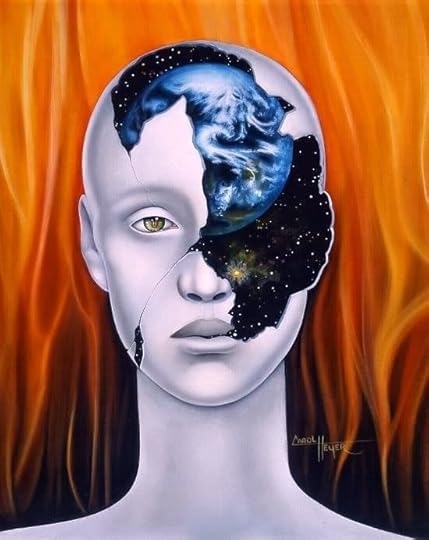 The quiet lull of the womb quickly and forcefully gets opened by the real world. The noise, the vague sights, all come barging down neuronal paths, blazing trails that will help determine the future of emotion, thought and the stories that bind them all together. For most this is the beginning of a long journey of self-discovery, when "self" is barely recognizable beyond an extension of mother. That journey is one of constant appraisal, both internal and social, in the hope that a singular story will provide focus, intention and direction.
The quiet lull of the womb quickly and forcefully gets opened by the real world. The noise, the vague sights, all come barging down neuronal paths, blazing trails that will help determine the future of emotion, thought and the stories that bind them all together. For most this is the beginning of a long journey of self-discovery, when "self" is barely recognizable beyond an extension of mother. That journey is one of constant appraisal, both internal and social, in the hope that a singular story will provide focus, intention and direction.Growing up I watched "The Cosby Show" and during one episode Cosby sat down with the boyfriend of one of his daughters, meeting for the first time. The young man, when asked what he did for a living, explained that he was "on a journey to find himself." Cosby, clearly unimpressed, went into the kitchen and when asked by his wife whether he'd met the young man, responded "I don't know, he hasn't found himself yet." While clearly intended for laughs, the situation is not without a degree of poignancy for each one of us at various times in our lives. We all may not puff out our chests in a fit of intellectual pomp like the boyfriend did, but in every clique and group we belong to and are rejected from, in every career path we envision and life goal we decide upon, there is a desire often reeking of desperation. That desire of belonging, of identifying with a larger group, is prodded along by the ever-close feeling that without belonging then life is unable to have meaning.
Americans especially voice an often quite vocal pride in "being their own person," and undoubtedly there's a chorus of such declarations being made against the last statement. Before jumping on that bandwagon, I'll encourage a pause and reflection. When hearing the descriptor "liberal" or "conservative," is there an immediate emotional reaction? Is the reaction stronger connected to the label that you don't subscribe to? How about relationships? Is there any kind of strong emotional reaction to "monogamous," "single," or "open"? Again, is the reaction stronger when connected to one you don't identify as? How about the terms "management" and "employee" or "the 1%" and "the 99%"? "Feminist"? Whether identifing with or against, the immediate emotional reactions and the mental images brought up associated with them, indicate that regardless of any desire to not be a person of labels, there is an inevitability of such guiding our thoughts/emotions.
Guidance, however, does not have to write the entirety of our stories. From the sectarian conflicts in the Middle World between Sunni, Shiite and Kurds, to the American social turmoil between gays and straights, and religious identification of being a "true" believer, the result is a false division of reality. Whatever may be said about the social, political and historical roots of all these wars of identification, and there's plenty of good analysis to be had, the final point is a recognition of an artificial division of reality that is ultimately unhelpful. Labels are inevitable, they provide an easy means of categorization, but to conflate them with a holistic picture of a person is to also inevitably miss the vast array of other personal facets in existence. This is true whether it be of the person being looked at or the person looking back in a mirror.
I work with dozens of people diagnosed with an array of mental pathologies. Determining what category their behavior generally falls under can and often is helpful in providing care, just as it is helpful in social interactions, to a similarly limited degree, in knowing the labels someone else falls under. I've found though that in every-day interactions, the relationships formed are better, more fulfilling and beneficial to all involved when the person is looked at as a holistic being. The same holds true in all other social interactions.
Social media is often blasted for encouraging isolation, but truly I think it is far more accurate to say that it provides an easy path for parsing and displaying individual facets of ourselves. The jerk who wrote that nasty comment likely goes home and loves their children, even as the compassionate person may go offline and yell at their spouse. Finding an identity is part of life's journey, but it is only an identity. Our self-stories need not be burdened by an over-reliance on any single one.
If we actively engage with an ever-widening array of our potential expressions, we have that much more with which to interact and respond to others and changing circumstances. The reverse is also true, as our reactions to others are keyed to the identities or labels they're placed under, so how we react to others is contingent upon how varied our view of them is. The political opponent is also a spouse, worker, lover, hobbyist, etc. An expansion of perspective helps everyone.
© David Teachout
Follow my blog with Bloglovin
September 6, 2014
The Futility of Constraining Human Sexuality

Question: If I catch myself staring at this one boy's muscles, does it mean I'm gay?
What I love about my shared humanity is the incredibly powerful biological drives. Certainly there's more to being human than this, but let's just look at the gross biological. We eat and keep on eating well past when it is healthy, and/or place items in our mouths that are not nearly as nutritious as we hope they are, all based on a desire, a drive, for nourishment and calories.
Similarly, our bodies exude sexual energy in near everything we do, the act of movement itself a creative enterprise driven by the need to build, to make, to become. Frankly that's sexual and there's absolutely nothing wrong with it. Now, as in the need for calories, our need for sexual release can be exclusively focused on to an unhealthy degree and the things we do to satiate it may not be nearly as helpful as we initially think. The ethical considerations for this are numerous and worth exploring, though at no time should the mere existence of a sexual thought/feeling be judged as shameful or wrong or serve to define the entirety of who you are.
Let me be very clear here, there is absolutely nothing wrong with looking at someone of the same gender and finding they or an attribute about them sexually appealing or attractive. People are beautiful and sexy, period. Ignoring that fact will only encourage a confusion when such thoughts about someone else come up. With that in mind, finding anything attractive about someone else in no way points to any particular sexual orientation.
Now, as to being gay or some other orientation, I'll be honest and note that I find the whole orientation labeling a practice of limitation. I get why it's done and for many there's an empowerment in deciding to focus on an orientation as a means of identity. That's wonderful and I support them utterly in that. Unfortunately what all too often happens is that the thoughts/emotions arising from within our internal/external interconnected worlds do not care about keeping within the boundary of an orientation or any other label for that matter. One way to deal with this is to create new labels and spend our time and energy parsing behavior to such a degree that the label becomes meaningless. Frankly I think we already have a great name for our experience, one that differentiates us from other biological creatures and yet still holds plenty of space for exploring what it means for each person: humanity.
Like who you like, appreciate them for any and all of who they are, always being mindful that there are depths and possibilities for each person hidden from any single perspective. Whether you decide that you're gay, or lesbian, or any other orientation is secondary to dwelling in the magnificence of what is to belong to this shared living experience called being-human.
© David Teachout
July 13, 2014
Faith As Leading To Mob-Rule
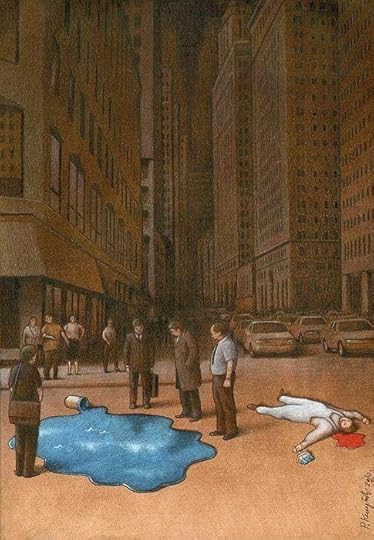
The Supreme Court decision in the Hobby Lobby case has been handed down and then expanded quietly. The immediate response has been nearly constant criticism, calls for women to rise up and declarations of impending religious rule. I've hardly been lacking in reticence for my own shrill pronouncements, so the potential hubris involved in any critique of the criticism is front and center for me. As such I won't be critical so much as point out what most have not, to offer that spirit of dissent I try to keep alive and well within me.
What is commonly missing in most criticism of the Hobby Lobby decision is a recognition of the different means by which people in the religious camp are coming to their conclusions. This absence is so appallingly blatant that despite the Supreme Court noting how the original religious abnegation statute in the ACA contributed to their decision, in a recent attempt by Democrats to mitigate the damage done by the court decision, they have decided to keep the same religious exemption. However one may accurately refer to this as a political stunt in no way removes the glaring absence of understanding what is a foundational problem: that of faith being used as a valid epistemic tool.
The Supreme Court stipulated that the corporation must indicate a "sincere belief." Moving beyond, but not forgetting, this rather insipid means of determining the legitimacy of subjective mental states, the underlying process that supports said belief is left unscathed. The notion that life, by which is meant the divine spark or imago dei, begins at or by the intention of conception, is rationalized only within a religious construct held together by faith.
Peter Boghossian, in a tour de force of redefinition, calls faith "pretending to know what isn't actually known." (1) In other words, a particular piece of declared knowledge has no external or socially objective means of verification, leaving said knowledge wholly within the realm of the internally subjective. Basically faith is the means of establishing warrantless confidence. Let's work backwards from the conclusion of those who "sincerely beiieve" the notion that birth control is a means of abortion. One step before is the belief that abortion is the ending of a life. Further back is the belief that said life is an established manifestation of God's will. Further still, God works in mysterious ways that are his to share if and when he determines are appropriate. Finally, foundationally, God as established in a particular Holy Book, exists. This is not merely ignoring science, this is an internally coherent interwoven set of beliefs that is contrary to the methodology of science. This is not about stupidity, it is about how one frames an understanding of existence.
With this in mind, focusing on the effects of faith is about as useful as removing the symptoms of an illness, the person may be able to go about their daily life easier, but their body is still being ravaged. Indeed, without treating the core disease, the person may find themselves in a worse situation later. Such is precisely where we find ourselves today with religious ideology being legitimized as a means of circumventing legal reasoning.
Faith-based interventions manifest two distinct social problems. One, pretending to know what isn't actually known provides grounds for the legitimacy of delusion. Two, because faith is solely an internal subjective system of knowing, there is no means of correction, no path for deligitimizing any delusional statements. The effective result is mob-rule.
Let's keep "delusion" simply in the realm of "a truth-claim that is objectively unwarranted" rather than delving into pathology. With this in mind we can all, if honest, note previously held ideas that fall into this category. For that matter, it is undoubtedly accurate to say that there are truth-claims currently held by myself or any number of people that are delusional in this sense. This is simply an inevitable consequence of being human and the always tentative quality of knowledge. In a law-based society, the attempt is made to codify in broad social interactions the legitimacy of scientific inquiry and rational dialogue. This maintains a theoretical basis for the interactional quality of existence, that knowledge is tentative and constantly evolving in understanding, and social policy is therefore to be based on what is accessible to all on an equal footing. In other words, no special requirement is to be possessed to understand, debate and possibly change any legal/social policy.
Faith does away with all this. By creating a space where delusion is sacrosanct, where special knowledge gained by means unaccessible on socially equal grounds (i.e. divine revelation), a law-based society is impossible. The very foundation is destroyed. With truth-claims cut off from rational debate, the legitimacy of one's subjective claim is established only by the quantity of adherents. I've heard it said that "one man's cult is another man's religion," the only difference being the breadth of devotees. Within the context of establishing social policy, this is no different than mob-rule.
Fighting a single legal case may win a battle and offer temporary benefit, but the war for human civilization rests on institutionalizing reason and scientific critical inquiry as the means of increasing our knowledge of our existence.
© David Teachout
(1) Boghossian, Peter. "A Manual for Creating Atheists"
June 3, 2014
How To Understand Women Better
 Lyrical masterpieces have, to varying degrees of success, attempted illuminating the many so-called mysteries bound within women. A common refrain given to men from teens onward points to women as unfathomable. I've always considered such false sagacity, or quaint household wisdom, as particularly troubling. Given the curiosity and excitement of a teen brain, the declaration entails cutting off what should be a world of inquiry and often removes from conscious connection a means of establishing a full or mature relational bond. Little wonder then that so many forms of relationship end up being generated upon base sexuality or game-playing or other tactics of distancing. Authentic understanding seeks closeness, finding the mystery and majesty in every revelatory experience, rather than the ineffable.
Lyrical masterpieces have, to varying degrees of success, attempted illuminating the many so-called mysteries bound within women. A common refrain given to men from teens onward points to women as unfathomable. I've always considered such false sagacity, or quaint household wisdom, as particularly troubling. Given the curiosity and excitement of a teen brain, the declaration entails cutting off what should be a world of inquiry and often removes from conscious connection a means of establishing a full or mature relational bond. Little wonder then that so many forms of relationship end up being generated upon base sexuality or game-playing or other tactics of distancing. Authentic understanding seeks closeness, finding the mystery and majesty in every revelatory experience, rather than the ineffable.Let's start with removing the assumption that women are somehow "other." As in, other than male, other than rational, other than...whatever comes to mind. This means removing the "us and them" mentality that so ridiculously characterizes dialogue between genders. Not incidentally, this also entails removal of the "us VS them" combative or adversarial mentality. Beginning there is, like in war, to assume a gulf between two opposing sides. All of which also means being in complete disagreement with any answer that declares women are "ruled by" and then listing a set of things reeking of a dogmatism taken from religio-cultural upbringing, social authorities or one's arm-chair philosophizing.
Starting there, we can move on to noting women, as are men, are first and foremost human. This point may bury the meter in obviousness, but due to being so obvious it is often quickly ignored or dismissed. Incredibly, the complexity of the human animal is thoughtlessly assumed immediately knowable by simple virtue of belonging to the species. Given the rampant confusion in so many lives about decisions, emotional states and the sources of behavior, this assumption seems the height of hubris.
Without going down the rabbit-hole of specifics, human beings are characterized by 1) a pervasive need to organize their experiences into narratives and 2) derive personal and/or transcendent meaning from within those narratives. In practice this manifests within socio-cultural and familial structures as well as individual proclivities given from temperament and how a person's mind emerged from their genetic/environment.
It is within the practice that people get hung up. Ease is found in isolating some social, familial or genetic particularity and declaring "see, women are that!" in some form of grandstanding. This comes up in various statements that women are more social or emotional, require certain needs connected with safety or the like, whereas men then end up being the opposite. See here the continuation of "us and/vs them" thinking? Not helpful.
Women, like men, because they are human and therefore intimately interconnected with every facet of existence are like a Mandelbrot art form. Certainly at an isolated perspective they're fascinating, even perhaps mysterious, but this is due to the continuation of "other" thinking, isolating and ultimately demeaning that it is. Once perspective is broadened to note the near-infinite permutations both real and potential cascading back and forth in time, each woman (and man for that matter) is seen as "us in them" and "them in us."
Want to know a woman better? Want to know anyone better? Stop thinking of her or them as only one characteristic, as only a part and therefore apart. Consider instead all that may be currently unseen, seek through listening and inquiry what one is ignorant of and always remember that we share this thing called life.
© David Teachout
May 27, 2014
In The Name Of The Soldier
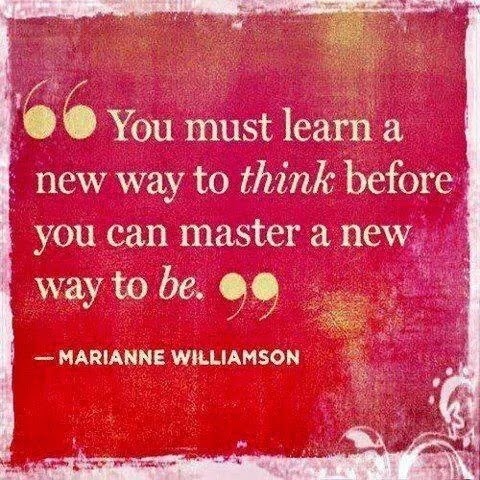
Ayn Rand defined "sacrifice" as the substitution of a greater value for a lesser one. On Memorial Day, honoring the troops that have fallen in sacrifice should then be more carefullly considered. What they have fallen for is attempted to be explained, to varying degrees of self-serving purpose, as justifying this loss. The result, however unintentional, exalts death beyond the finality it truly is to a level of transcendent purpose. This strategic tragedy, death as exultation of life, obscures the reality of what societies ask of their soldiers. Remembering the final loss inherent in death is important, but should not cast into shadow other losses of at least equal concern. The ready ability to take another human life, contrary to Hollywood depiction and the cult of the fictionalized soldier, is not without consequence.
"War does violence to the warrior, for in addition to the extremes of terror and fatigue confronting soliders, they must also find some way to come to terms with the enormous guilt that arises with the taking of human life. In the popular imagination, soldiers unflinchingly perform their duties and are emotionally unscathed by their experiences. But this image is tragically flawed." (David Livingstone Smith, "The Most Dangerous Animal: Human Nature and the Origins of War") As Smith notes, the ready ability to take a life is not something innate, but must be instilled by training. Our shared humanity is repulsed by the deliberate taking of life. Commitment to the act requires training, or some variation on losing sight of that shared being-ness, whether it be through psychosis or an overwhelming emotional state, drug use, or psycho-ideological means of shifting someone to become an "other."
In any case, the result is the same, the person committed to violence must shut off, however momentarily, that innately felt sharing of humanity. We blithely as a society shrug off this request being made of our fellow citizens, inured as we are by the space afforded us by media and statistics. This loss, momentary but persistent, is a request of service being made of each and every soldier. In its deliberateness there exists a sacrifice greater even than a final death. Greater because it is a constant aspect of their reality, something that must continue to exist as a pervasive aspect of their every-day living. We have requested not simply that they accept their eventual or probable death, for that is no different than anybody else, but that they hold in persistent readiness the ability to divorce themselves from a shared humanity.
Picture this as a weight being held, lactic acid building up, burning sensation growing and growing to a point of such pain that the only way to remove the suffering is to let the weight go. The soldier, however, is not allowed to give up their responsiiblity, to leave the burden behind. They must always be ready and in this readiness, in this ability to break the bonds the rest of us take for granted in our relational reality, through which meaning and purpose are derived, we ask them to take in a little death each and every moment. It is little wonder the bonds of camaraderie that exist in combat are so strong, they are the only ones in the midst of war that remind them of what is still sacrosanct.
On Memorial Day, the loss found in death should never be forgotten. However, nor should we think this was the only one, it was simply the last. When considering what are the proper or correct reasons for combat, remembering there are sacrifices of at least equal burden to final death, weights that cannot be let go, should be brought front and center. In doing so we will perhaps recognize the enormous responsiblity we have as a society to those who are asked to cut themselves off from it.
© David Teachout
April 29, 2014
Like Everyone Else, You're Unique
 In the first halting breath of a new romantic connection, when the eyes meet, the heart flutters, and a cascade of stories spiral out like a new galactic frontier, it is safe to say that nothing feels more unique, more singularly special. Every one of us dwells in that moment and generally throughout each day, within the notion of being an individual having a particular blend of feelings, thoughts and images. What other way of living could there be? Contrary to the poster-child of subjectivism, an individual uniquely set-apart from the rest of creation by possessing a soul or self, there is an alternative. That alternative provides the space to step away from a life of separation and into one of belonging.
In the first halting breath of a new romantic connection, when the eyes meet, the heart flutters, and a cascade of stories spiral out like a new galactic frontier, it is safe to say that nothing feels more unique, more singularly special. Every one of us dwells in that moment and generally throughout each day, within the notion of being an individual having a particular blend of feelings, thoughts and images. What other way of living could there be? Contrary to the poster-child of subjectivism, an individual uniquely set-apart from the rest of creation by possessing a soul or self, there is an alternative. That alternative provides the space to step away from a life of separation and into one of belonging.Living relationally is not simply about being mindful of the interconnections pervading every moment of our lives, from the mundane of molecular combinations giving us air to breath and water to drink, to the complex social patterns of whole societies and the familial webs of each person. Interconnection is our very breath and blood of life. More than this, however, is a required recognition that the location of our perspective determines what we are capable of seeing. The result of either perspective is either a focus on being unique and in no small part separated from the rest of nature or bound within a near-infinite inter-web of a singular substance.
Imagine four bounded circles, each one encapsulating the others like a set of mixing bowls. From inner to outer they can be labeled as 1) personal narrative, 2) behavioral patterns, 3) social and cultural triggers, and 4) universal potential. If looked at from the inside-out, one's uniqueness is never in doubt, in fact it becomes the means of determining whether to give consideration for any idea, advice or information. Beginning here is where such notions as "my truth is my truth and doesn't have to agree with anyone else" and "nobody understands what he/she and I have together." Such thinking results in separation and interpersonal turmoil, though it certainly helps maintain a belief in the supremacy of the ego.
If instead one begins from the outer circle, that of universal potential, everything shifts. Rather than the self being penultimate, "I" exists as simply one among an infinite potential of variable outcomes. Even the "one" here is a small over-statement as there is no dot to pinpoint a singular location, but a scatter-gun of interconnected dots out of which emerges a felt sense of individuality. There is uniqueness, but no longer in the sense of an "I and them," rather an immersion. As Buber, in his book "I And Thou" states: "Immersion wants to preserve only what is 'pure,' essential, and enduring, while stripping away everything else; the concentration of which I speak does not consider our instincts as too impure, the sensuous as too peripheral, or our emotions as too fleeting -- everything must be included and integrated. What is wanted is not the abstracted self but the whole, undiminished man."
From this perspective of immersion, we can see where being caught up in the uniqueness of our selves and our particular relationships is both understandable but also myopic and limiting. If we consider any situation only from within the inner-most circle, this both shutters our eyes to the possibilities that exist in universal potential and is a willful blindness to the reality that we are embedded in a relational reality. Behavioral patterns and social triggers do not cease simply because of a projection of individuality. Nor does the potential cease to exist of other people or ideas illuminating our experience. Immersion allows for healthy skepticism and provides the space for introspection and collective analysis.
When considering next how different personal struggles are from any others or how one's relational dynamic is so distinct from any other, it is important to remember that one's narrative is self-serving and therefore prone to blindness. Our difficulties and ways of behaving certainly feel like they are unique, but they are such only in so far as any other emergent quality in interconnected reality. In this way we are none of us alone, none of us separate and all of us together in living.
© David Teachout
April 1, 2014
Relational Expansion In Communication
 A sense of belonging is both a constant desire and a powerful impetus to act. “The creation of ourself in the image of awakening is not a subjective but an intersubjective process. We cannot choose whether to engage with the world, only how to.” (Batchelor, p. 106, Buddhism Without Beliefs)
A sense of belonging is both a constant desire and a powerful impetus to act. “The creation of ourself in the image of awakening is not a subjective but an intersubjective process. We cannot choose whether to engage with the world, only how to.” (Batchelor, p. 106, Buddhism Without Beliefs)Ponder for a moment the static-living inspired by ostracism, the insular feelings feeding on one another in a spiral of self-destruction. Think on the outcast who mutters to himself, the social pariah who drowns in a sea of her own grief. On the opposite side, consider the sense of connection when news breaks of a disaster and the images of people suffering become an extension of our family. Feel the pull of the sight of starving children or the internal anxiety when a baby is heard crying. This community sense pervades our emotional lives, fed as it is each and every time we engage in communication of any sort.
From advertisers to preachers, actors to used car salespeople, the extraordinary variability in what emerges through communication is the root cause of sales techniques to selective phrasing in giving speeches. Were communication an issue of a linear, one-way, relationship, where a receiver decodes exactly what is presented, there’d be no concern over mis-speaking or failing to make a point in such a way that it is actually heard. What communication is, is communal-creation. Communication is not just an act, but a principle of living.
Communication is not two separate and context-free individual entities lobbing words at each other, it is an interplay of energy and information within the vastness of a context-full reality. That person you didn’t know anything about, standing in a corner, relates to you only in the sense of a shared presence and common humanity. Dialogue strengthens those bonds but it also allows for the emergence of something else: community. What was before not bonded with becomes indelibly linked, what didn’t exist in one form of relationship begins carrying a greater weight with the emergence of another form.
In each and every new emergent relationship, is the incredible nature and power of communication, where the interchange of information is combined with the flow of energy between two or more people in an existential union. When engaged in communication you are joined in an evolving world, the making of which is a product of both the means of interacting with the information at hand and the energy patterns associated with the history of experiences and their recall for everyone involved. Daniel Siegel describes the individual in the tri-part way of an interaction between mind/body/relationship, that interaction manifesting as the energy flowing through it all. Expanding on Siegel, those relationships are both internal, in the sense of all the selves we embody, and the so-called external social connections.
Notice how when meeting someone new, the nature of the social interaction makes some topics easy and others not. For that matter, the whole feeling of whether one is “clicking” with someone or not is a testament to the ebb and flow of relational energy being processed. Psychologically we look at this through the lens of priming and mental heuristics where a person’s dress, smell, cosmetic look, phrasing, etc. are all distilled through how we were raised and culturally taught, to look at people and judge well before a single word is spoken.
Whatever the form of communication, the process provides a place for an emergent relationship, one that is not a thing in itself, but an amalgamation of all that is being brought in. Seeking to understand it is the journey of a life-time. Ever wondered how some people, whether they’ve been around each other a long time or not, can finish the other person’s sentences? Ever question how you or someone else simply knows what another person is feeling before they open their mouth? Those feelings of uncertainty when you walk into a room letting you know you’re not wanted, or the opposite feeling of being utterly held, both are properties of the communal creation of communication, the interactive existential bond of our shared humanity.
The importance of this principle can be realized in every misspoken word, every misunderstanding, every response to being “seen” or rejected. We are not billiard balls bouncing off one another in straight trajectories of hoped-for intention. We reside in a soup of constantly evolving, emerging relationships, with every uttered word and shift of body projectively making the potentialities residing between us all more and more possible until something happens in perception.
Our world is a maelstrom of interacting variables, of which we are but one. Our greatest hubris is to believe that because we feel ourselves creating our stories, the essence of being conscious, that we are somehow the progenitor of our lives, the key ingredient without which nothing would happen. The reality is so very much grander than that, though it does nothing to assuage our egos. “Courage consists in being reliant on oneself and others to the extent that, irrespective of differences in physical and social circumstance, all manifest in their behavior and their relationships that very same spark which makes us recognize them, which makes us crave their assent or their criticism, the spark which means we share a common fate.” (Maurice Merleau-Ponty, World of Perception, p. 88)
In every communicative gesture in word or deed we expand our humanity, realizing in every form how community is essential to the holism that is each of our lives.
© David Teachout
March 24, 2014
Boundaries Are Sponges
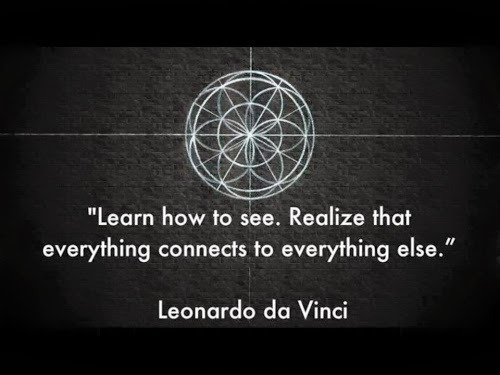
“Give me some space.” The request starts small, can quickly escalate, burdened as it is with the emotional weight of feeling trapped, harried and closed in. At any given time in our lives, many of us have uttered the phrase, or wanted to, or heard it from another. Often, though not always, the accompanying response was filled with its own share of hurt feelings, remorse for projected wrong-doing and concern over what it meant for the relationship in question. The desire within the request and the emotional responses tied to it are all predicated on the belief that walls are coming up, boundaries are being established. These lines of demarcation delineate between “I” and “you,” and socially between “us” and them,” though in both cases are considered uncrossable, certainly they are felt as such. Feelings of being cut off, cast out, and set aside, hit like a knife to the flesh.
Speaking of flesh, our bodies provide our initial foray into the setting of boundaries. One of the initial developmental stages is a recognition between infant and caregiver, one in which we begin to think of the world and everything in it as being “out there,” and our self as being “within” the skin. While this is a needed separation for biologically relating to other objects, we’d certainly have a hard time talking with others or even of tying our shoes if we didn’t have a means of differentiating, these initial experiences of establishing boundaries can result in unnecessary hurt and misunderstanding later in life. They give a false impression about what is entailed in living our lives.
The false impression is one of impregnability. Walls as high as the sky and thick as steel, only letting things in that we want, only being effected by what we choose to let effect us. Then we get surprised when people continue to be able to hurt us, when we still react to memories inspired by sights and smells, when we find ourselves engaging in behavior that always in the past helped us move forward but is no longer as powerful. Keeping the demons at bay, we come to find that our walls are not as solid as we hoped and then, still believing they should be, castigate ourselves upon the altar of false belief concerning our autonomy.
Rather than walls, boundaries can be considered more like sponges. If it’s initially easier, consider your own skin. There are actually individual cells that pick up heat, cold and pressure. The cells are microscopic so we can’t tell the difference, but with a small enough pin we could poke and feel only heat and not pressure or vice versa. In addition, the strength of the experience is based on longevity and intensity. We can get used to higher temperatures if gradually increased rather than blasted upon us, in much the same way as pressure works. Our skin also absorbs water, though after a time gets a prune-like appearance once saturated. Hence a sponge. There’s only so much that a sponge, like the skin, can take in before it hits a point of saturation. At which point, something must change.
Notice here the phrase “take in,” it’s very deliberate. Just as a sponge will become heavier when soaking up water, so any clear differentiation between the sponge and the water is lost. Where does one start and the other begin? In the felt experience of everyday life, the lingering effect of the pain lasts far longer than the object of its causation. For that matter, in sharp trauma, the removal of the object having pierced the skin must be removed carefully else could cause even more damage. There is no movie magic to rely on here. We can no more separate ourselves completely from the world than we can declare any particular situation will have only the effect we desire. We take in, reach a point of saturation, then something happens, whether that be an action on our part or a shift from the other.
Not to paint only a picture of suffering, the same holds true of pleasurable experiences. Even the most sociable of people will eventually become overwhelmed by too many people. Bingeing on sweets eventually leads to stomach pain. More benignly, we can hear something a hundred times and only truly take it in once or see ourselves for the first time and notice a change. Everything from sex to exercise has a point of saturation. We take in only so much before something has to change. Training helps, hence why star athletes can do more than the average person and how drug use, of any kind, has issues of tolerance attached to it. Some people have an innate higher tolerance than others, though unfortunately it’s impossible to know ahead of time. A roll of the sponge-dice as it were. As it is with drugs and other experiences, so it is with relationships and their emotional carry-ons. We may be in awe of how someone could come out of a particular experience and go on with their life, never knowing that that the very same person could go through something you did and never recover.
Knowing our boundaries are like sponges helps us consider the situations we engage in, in a new light. Gone is the hubris of not being effected, gone is the grounds for mentally berating yourself when still reacting to a co-worker, former lover, family member, or anyone else who inspired a hurt or pleasure. We are all, every one of us, living in an inter-connected and therefore interwoven world, where there are no clear lines between “I” and “you,” “us” and “them.” Our sponge-like boundaries may not feel as safe as the walls did, but the walls never existed anyway. The greatest expression of our humanity exists not in our separation, but in how we move and breath within the world of permeable selves.
© David Teachout



